Otim quit his job to create software that would help small businesses
“That period taught me that there is nothing like too much work. They did not baby us despite the fact that we were less experienced. They challenged us to the extreme. I think I grew a lot from it. I learnt to take the pressure. Although I did not realize it at the time, I really needed it.”
Francis Otim is the chief executive officer of MMINDZS Limited, a regional trend-setter in cutting-edge mobile payments and accounting systems for small businesses (SMEs) and Enterprise clients. They do business support for SMEs and enterprise clients through technology and have so far worked with over 3,000 SMEs in Rwanda and Uganda since 2014. The company employs about five people directly and indirectly. But it has been an uphill task getting here. After quitting his bank job to pursue this; his vision and conviction, Otim was soon confronted by seemingly insurmountable odds. He told SEBIDDE KIRYOWA how he overcame all this to get to where he is today.
Earlier life
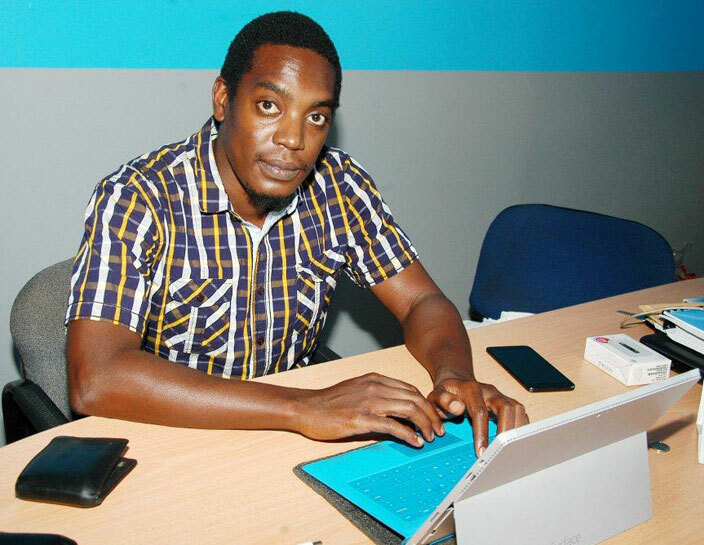
Francis Otim was never very good at conforming. He was never one to settle for the conventional. This was the case right from school.
"While in school, I was so detached from what I learnt. I remember I was so disillusioned with the education system. I just felt that it was not for me. I felt like there was something else; something better I was supposed to do than sitting in class cramming theories," he says.
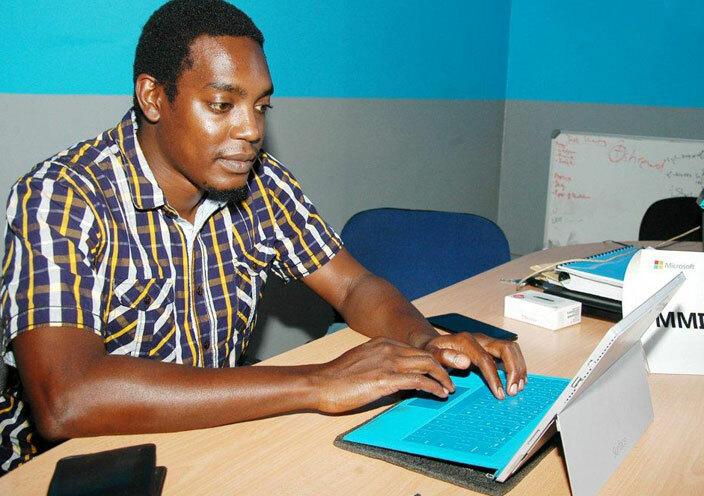
Francis Otim
His indifference ‘paid off'. He scored nine aggregates in the Advanced Level finals in 2002 at Makerere College School and was admitted for a Bachelor of Arts (in Arts) degree course specializing in communication skills and French as a private student.
"This was certainly beneath my potential. It was the lowest course in terms of regard," he recounts.
"Friends ridiculed and teased me about it saying BA(A), stood for Being Around Around, an indication that I was only wasting time. I didn't blame them much. Most of my friends were given ‘respectable' courses like pharmacy and medicine and here I was studying communication skills," he recalls.
Ironically, it was through studying communication skills that Otim discovered his purpose in life. He got a rare perspective on life and for the first time, things made sense to him.
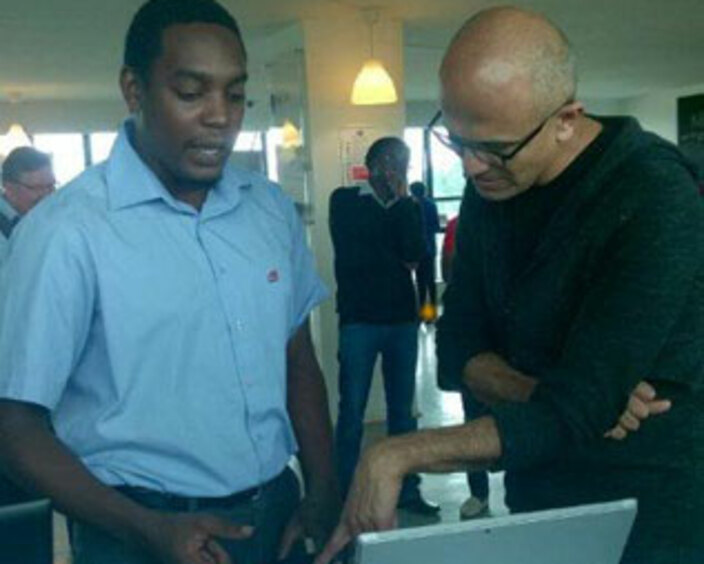
"In behavioral communication modules, we handled both mass and development communication. I felt like this was something I could apply in the real world; like it was practical," he says.
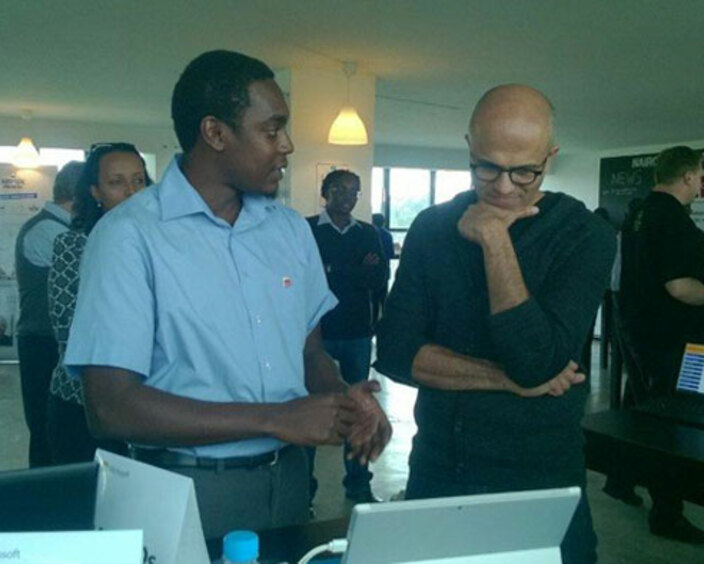
"It certainly made more sense than the busen burner I used in the chemistry lab. I felt that it was a more practical way to handle the social problems in life."
This sat well with another conviction of Otim's; doing business that brought about development; a change in people's life.
Studying to become a chartered accountant
Before he joined university in 2003, Otim's elder brother, who had studied medicine but worked as a manager with Price Water House Coopers (PWC) Uganda, a prestigious auditing and accounting firm, had advised him to study a professional accounting course concurrently with his degree.
"He understood the confusion I was undergoing. To help me make sense of my life and get a direction in life, he advised me to pursue an ACCA (Association of Chartered Certified Accountants) course with a view to becoming a chartered and certified accountant," Otim narrates.
As a result, in his first year at university, Otim enrolled for Level One of ACCA at the Management and Accountancy Training (MAT) institute in Industrial Area, Kampala. However, it did not make a lot of sense to him. He felt like he was right back there in the chemistry labs of his school days.
"Besides, I felt that the course was tailored for corporate people and that for me, at my stage, it was too expensive for no good reason."
Although he did not quit, he decided to pursue it his way.
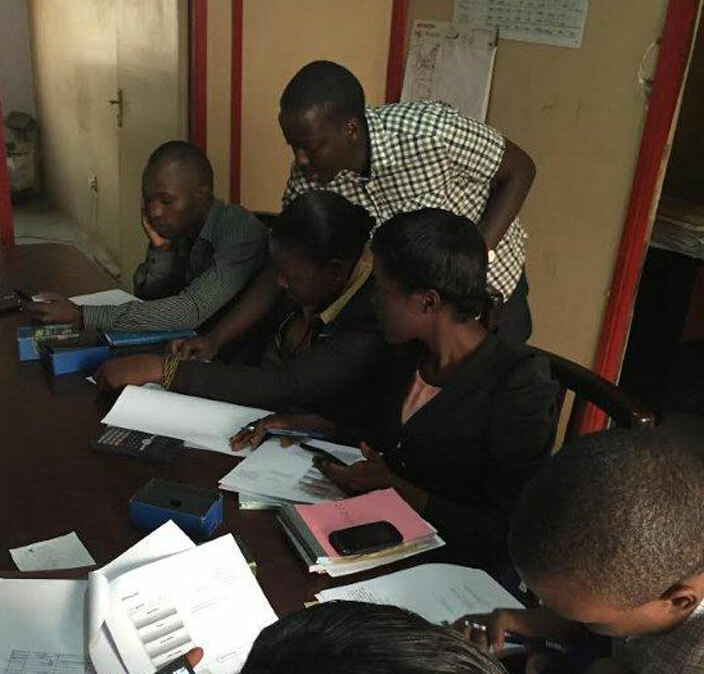
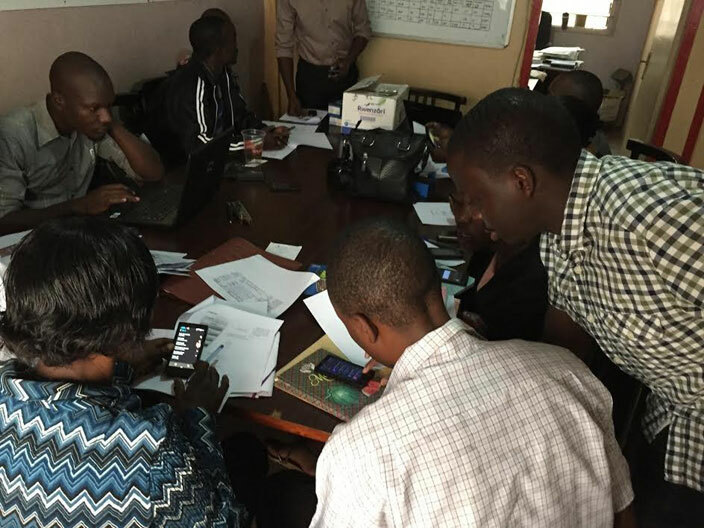
Training a beer diribution client
"Since the exams are conducted independent of any local institution, I chose to buy my own books and read them in my room at campus without necessarily having to pay tuition or attend classes at MAT. I would then sit for the exams at the end of the study period."
This is how he did it all through the course, graduating from the third level in 2007, the same year he graduated from university.
Baptism of fire
All the while he studied with the hope that PWC Uganda would recruit him upon completion. But his hopes were thwarted when they did not. Otim then combed the job market for work but without much success.
After eight months of constant search, he landed a financial reporting job with Barclays Bank Uganda. He worked under the finance controller, Michael Ssegwaya, who trained him.
"This was the period when Barclays Bank took over Nile Bank. They launched about 75 Automated Teller Machines (ATMS) and 50 branches countrywide. They also migrated from one banking software platform to another," Otim narrates.
"They first had to upgrade Nile Bank from Equinox to Flexicube. This is a core banking software system by financial software maker, Oracle, which provided a comprehensive, integrated, interoperable, and modular solution that enabled the bank to better manage evolving customer expectations."
The sheer amount of work involved in this corporate take over as well as software upgrade was too much, to say the least, for someone of as little experience as Otim's.
"We worked from dawn to dusk. I do not remember ever seeing the sun during this period. My boss really pushed us. He was very strict and uncompromising. But things were not easy on him either. He did not take leave for a year and a half!"
What kept the team up was the chaos and the messes involved in the changes, sparking incessant customer complaints. Yet this mess proved the biggest learning point for Otim up to that time.
"That period taught me that there is nothing like too much work. They did not baby us despite the fact that we were less experienced. They challenged us to the extreme. I think I grew a lot from it. I learnt to take the pressure. Although I did not realize it at the time, I really needed it."
Quitting formal employment
But exactly after a year and nine months working in the bank, Otim started to get that feeling of emptiness again.
"I started asking myself; what am I doing here? What does all this mean? I felt like I had lost my sense of purpose so, in October 2009, I quit the bank job," he says curtly.
But Otim's move was going to be anything but easy. He had just taken out a bank loan with which he bought a car. Being a bank staff, he had acquired the loan at a highly discounted rate. Now that he was out, he would have to repay the loan at the market rate (double the bank staff) rate, which was going to be an uphill task without a job.
"I thought of rejoining employment but stopped myself because I knew that was not going to solve my issues."
Finding purpose in life
What was going to fill the void in Otim's heart and finally fulfill him was a greater cause and mission with a bigger impact on the general good; supporting organic transformational economic development.
"I figured as a poor country, for development to happen, it had to start from within, not driven by donors as the case is," he says.
One of these indigenous places to start with was business. Small Medium Enterprises (SMEs) are the engine and most important part of that chain. Unfortunately, 99% of SMEs in Africa close after three years. That was the problem he wanted to remedy by supporting them.
"The bigger picture was to help create businesses that transcend generations; besides, helping SMEs would have a ripple effect on many things in the economy."
So, Otim set about diagnosing the problem. He discovered that most of the SMEs lacked tools and skills for financial management.
"SMEs need skills and tools to survive. First I wanted to give them a tool to enable them attain proper financial management which was vital to their survival. This tool is accounting systems (software), which I would provide and help them implement in order for them to manage their finances better," Otim recounts.
"Then I would help them attain skills like basic accounting, tax management, cash flow, human resource management and other best practices which would facilitate better management and ensure business survival," he says.
Getting into SME consultancy, support services
In November 2009, he teamed up with two friends from his university days, Yusuf Mulinya, who was admitted for a statistics degree but quit to pursue ACCA fulltime and Allan Nfamba, who read library and information science at university but studied ACCA on the side.
Together, they formed Edge Consult, a company that offered business and accounting support services for SMEs.
To raise capital for the venture, Otim sold the car he bought with a company loan at sh13m for sh7m. The other two also raised money. They paid six months' rent for an office at Uganda House.
"We did not need much else. Yusuf and I both had lap tops. The biggest capital we needed thereafter was intellectual capital. That we had," he says.
They started off by spreading word of their services through word of mouth and leveraging personal networks.
"Landing our first clients was not really hard. Yusuf had been on the streets and had done some ground work. We started with GilGal Hardware in Makerere Kavule on Bombo Road and Capstone Investments in Kasanga, importers of sanitary towels," Otim reveals.
Their business model was that clients paid them a monthly retainer for services rendered. However, they also handled one off assignments like internal audit, internal control manuals, control reviews, drawing up business plans, business project proposals as well as bidding plans.
"We charged clients between sh500,000 and sh1m as retainers while one offs ranged between sh1m at the very least and as much as sh7m," he says.
Developing accounting software
After six months, they had too much work that they needed to sub contract it. Soon they realized that they could not impact as many SMEs as they wanted.
"The question then was; how do we scale this? How do we impact as many SMEs as possible when we cannot reach all of them? How we provide them with the tools and impart skills when we could not reach them in person? " he narrates.
The answer was in another tool. They decided to become virtual accountants.
"We decided that if we could create a system; software that could be used by all these people at the same time, we could have a bigger impact. That would create a balance between skills and tool."
In 2010, Otim quit Edge Consult and joined a company called Scyfy Technologies to pursue his new idea. He partnered with a one Revence Kalibwami, a brilliant programmer, who had just quit a company called Digital Solutions. I brought forth my business knowledge and he; his technical knowledge.
"We started off by doing work for very big projects and clients like UNICEF, Malaria Consortium, Ministry of Health, NGOs and other government agencies which unfortunately was again distracting me from my main aim of aiding SMEs," he narrates.
The money was coming in. They landed a $170,000 (about sh580m) contract with Malaria Consortium to automate health data collection from the field. The project was funded by the Bill & Melinda Gates Foundation, an American-based private organization that seeks to enhance healthcare and reduce extreme poverty globally through expanding educational opportunities and access to information technology.
However, despite the quick financial success of ScyfyTechnologies, Otim was still not satisfied because he felt they were not meeting the greater need which was empowering SMEs.
Starting Mmindzs Limited amidst financial hardships
In April 2012, Otim set up Mmindzs Limited to focus on his vision. Unfortunately, sticking to his vision meant walking away from readily available money into financial uncertainty.
He was still indebted to Barclays Bank. Since he did not have money, he had to set up office in his rented house in Luzira. Unfortunately, his house rent for the next six months was due and he did not have a penny to his name.
"It was a difficult time. I lost all confidence. Remember, I had not consulted anyone before I quit formal employment. It was an arbitrary decision so I had no one to fall back to."
He talked to his landlord, Peter Mukwahana, who understood and gave him time to sort himself out. But even getting by was a challenge. He could not afford food and often got by on a packet of Yoghurt.
"Things got so bad I had to get some support from my dear parents every now and then. 2012-2013 was the worst time in my entire life," he recounts ruefully.
"Everyone kept telling me I had brought this on myself; that it was a mistake quitting formal employment and that I ought to go and look for a job but I stuck to my guns."
But these hardships also brought him closer to God in whom he sought solace. He says he read the Bible keenly and eventually found the answers he sought in there.
"I had no strength to carry on. I had lost all hope. But there were verses in there that spoke to me; verses in which God told me to hang on in there," he recalls.
Silver lining on a dark cloud
To get out of his ditch, the first step was to find developers. Unfortunately, he did not have money to pay them and had to win their confidence on promises that he would pay them when money started coming in from clients.
At the beginning of 2013, he started work with local developers, who agreed to work with him on a sales commission basis and developed software they called MYAccounts, the first Mobile Money ready accounting system in the world. They got a chance to exhibit it during the (then telecom service provider) Orange Expo 2013 at Lugogo Indoor Stadium. Orange had given a free platform to software developers.
"We signed up to 15 clients on that day alone. Although the software was still a work in progress, we printed posters and talked to clients about our new idea. This was validation enough and it gave us the boost of confidence we needed to continue," he recalls.
Unfortunately, the tool was not quite ready. They needed more money to take it to the next level. They therefore started looking for partners. They teamed up with Orange Uganda and later Airtel who were then looking for developers to grow their AirtelMoney platform.
Developing MyAccounts software
To develop this software, the two were inspired by the need to provide accessible solutions to SMEs in Africa.
"Our research indicated that the reasons most SMEs lacked systems for financial management boiled down to a few; the software systems on the market were rather expensive with licenses costing up $1000 (sh3.4m)," he says.
"Secondly, the systems on the market were not tailor-made to the unique operations of our SMEs in Uganda. Most of them required computer interface and Internet. This is was too sophisticated for an average Ugandan SME. Then of course there is the little technical support for the few that can access the systems," he says.
The duo took in to account the technological profile of most SMEs; affordability and functionality of the software while developing MyAccounts. Their main aim, Otim says, was to make accounting accessible to the ordinary SME in order to improve their chances of survival.
How MyAccounts works
Most local SMEs (who bother to) will record their day's transactions in an exercise book and leave it at that. A trader will then call in an accountant whom they pay additionally to put the books in order at the end of the month.
What MyAccounts does is to take that simple transactional information and immediately post it virtually (on a Mobile Money account) in accordance to accounting standards at no additional cost to the trader other than a monthly subscription fee of sh50,000.
"For instance, a shopkeeper selling a shirt in a shop without a computer or electricity is still required to keep records as a legal requirement. All he has to do is use his kabiriti (basic, unsophisticated phone) and record the transaction in three simple steps," Otim explains.
"He has to enter the customer product he sold (shirt) and the price. MyAccounts then automatically posts his accounts formally in real time. His inventory will indicate one shirt less; his cash records will be updated and his tax returns (for those who are required to file) will automatically be prepared."
The salesman report or transactions are automatically done to enable the business owner know how much money they should have in cash vis-à-vis the stock they have left. A free demo available at www.myaccounts.ug
Since all the financials are organized according to financial reporting standards, a business owner can access the full reports of his business transactions including management records, sales reports and expenses by month, on a web interface or ask MyAccounts for print outs or summaries to be sent to their phone.
Implications for the client
- MyAccounts helps even the most financially illiterate of businesspeople prepare proper business records according to financial standards, a prerequisite for loans from financial institutions.
- Access to financial and management records in real time because transactions are recorded and posted as and when they occur.
- It facilitates inventory management since it keeps track of your stock
- There is automated preparation (not submission) of tax returns in case the businessperson needs to file their tax returns.
- It facilitates enhanced cash control through Mobile Money transactions.
- Selling and buying of businesses is eased by availability of records which make it easy for one to appraise business performance.
- It eases fraud detection because posting of transactions in real time makes it easy to detect irregularities.
Partnering with skills providers
But concentrating on MyAccounts meant that there was a void in skills provision.
"Now that the SMEs had the information they required, there was need for support services like interpretation or advisory financial services or how to use that data to grow. Ultimately, this is what helps them add value," he says.
But rather than start another company like Edge Consult to do that, the duo decided to partner with certified accountant firms to provide the support services for clients who need them.
Other services
Meanwhile, to supplement their income and ensure sustainability of the business, they diversified into other enterprise services market census (profiling) for companies; distribution automation and Mobile Money Interaction through which big corporate companies get payments from clients in real time from the distribution of their products.
"This started in 2014 and has been incredibly successful. We have so far worked with clients like Uganda Breweries Limited (UBL), Airtel Africa and done pilots for BAT. Although they have been far between, the deals are lucrative. In 2014, we managed to make a gross of about $140,000 (sh480m) from these services."
Unfortunately, he says, the payments are often over delayed which negatively affects cash flow in the business.
Turning point
In November 2014, while working with Airtel Africa on Mobile Money Interaction, they got a deal to work in Kigali where they signed up about 2000 clients in a month.
This deal gave exposure and lead to their next victory - an innovations award worth $100,000 (sh343m) in 2015 from the Bill & Miranda Gates Foundation for supporting SMEs in Uganda.
As result, Otim and his partner have hit about 3,000 clients and are building support structures.
"We are looking at scaling to SMEs in Tanzania and sub-Saharan Africa which now possible with partners like the Bill & Melinda Gates Foundation and the Microsoft Corporation," Otim says.
In an effort to grow, last year they partnered with professionals and created a new company called Smart Business Intelligence, a subsidiary of Mmindzs, which will focus solely on technology while Mmindz remains focused on other projects in agriculture and health.
Moving office
Earlier in 2013, when he was trying to overcome his struggles, Otim decided to leave his home office where he worked from and moved in with Arthur Ntozi, a friend who ran a company called Sendairtime.com, at Akamwesi Building in Nakawa. He needed the discipline to work. They shared the office between three people.
In early 2014, they moved to Jofra House in Bugolobi as the business grew. He still shared the office and rent with Ntozi and one Mbonye.
Finally in February 2015, he stopped sharing and moved the company to Fil Courts on Lithuli Avenue, Bugoolobi.
Challenges
- Finding competent software programmers for our software systems in Uganda has been a challenge. Often times, we have had to outsource from outside the country because these are more efficient and reliable.
- There is a general lack of interest from the government in what we do. We are instead getting help from people like the Bill Gates foundation and Microsoft Corporation from miles away, which is a real shame.
- Businessmen, especially traders, in Uganda have generally not embraced technology as a business support tool. You go to a trader in Kikuubo and once you mention a computer, they are instantly disinterested in what you have to say. We have to do a lot of reassuring.
What makes him tick
Just one thing; God Almighty. I believe God has blessed the works of my hands. Why? In business you are not in control. It is divine providence. That's how you keep in line during the bad times. There's not much you can do as an individual.
Advice to young people (Diamond tips)
- Do not chase funds, chase the customers. They will fund your business; they are the real investors in your business.
- If you want to start a business, just go ahead and do it. Do not first wait to complete other things or you will never get started. Start, suffer and then enjoy later.
- Try your best to keep costs of running a business down. If possible, rather than hire people, keep it at performance-based contracts.
What others say
Eric Olobo, client
Bencher Investment Ltd
Contracted Distributor with UBL
My Accounts is a cheap, home grown solution for our home grown businesses. It encompasses an accounting system, an inventory management, a human resource management system and best of all, it has Mobile Money capability. No other system in the market right now does that.
I have worked with him for about a year and three months now. He is an astute businessman. He has guided the company through some fairly dark times. He is a very result-oriented, no-nonsense and he knows what he wants. Peter Muzoora
Project manager
Smart Business Intelligence